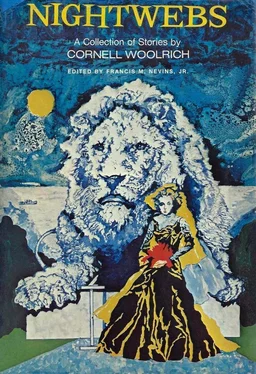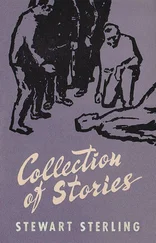I was too late. The silence told me that as soon as I stood within the room, and the last tinklings of shattered glass had died down around me. They weren’t here. They’d gone. There wasn’t a soul in the place! But there were signs, when I crept down the stairs gun in hand, that they’d been there. The downstairs rooms were heavy with the thickly cloying scent of fresh flowers, ferns and bits of leaf were scattered about the floor. Folding camp chairs were still arranged in orderly rows, as though a funeral service had been conducted. Facing them stood tapers thick as a man’s wrist, barely cool at the top, the charred odor of their gutted wicks still clinging to them. And in a closet when I looked I found her coat — Joan’s — her hat, her dress, her little pitiful strapped sandals standing empty side by side! I crushed them to me, dropped them, ran out of there crazed, and broke into the adjacent graveyard, but there were no signs that she’d been taken there. No freshly-filled in grave, no mound without its sprouting grass. I’d heard them say they had others. It had grown dark long ago, and it must be over by now. But how could I stop trying, even though it were too late?
Afterwards, along the state highway, I found a couple sleeping overnight in a trailer by the roadside who told me a hearse had passed them on its way to the city, followed by a number of limousines, a full two hours earlier . They’d thought it was a strange hour for a funeral. They’d also thought the procession was going faster than seemed decent. And after an empty gin bottle had been tossed out of one of the cars, they were not likely to forget the incident.
I lost the trail at the city-limits, no one had seen them beyond there, the night and the darkness had swallowed them up. I’ve been looking ever since. I’ve already broken into two, and I was in the third one when you stopped me — but no sign of her. She’s in some city graveyard at this very minute, still breathing, threshing her life away in smothering darkness, while you’re holding me here, wasting precious time. Kill me, then, kill me and have it over with — or else help me find her, but don’t let me suffer like this!
The captain took his hand away from before his eyes, stopped pinching the bridge of his nose with it. A white mark was left there between his eyes. “This is awful,” he breathed. “I almost wish I hadn’t heard that story. How could it be anything else but true? It’s too farfetched, too unbelievable.”
Suddenly, like a wireless-set that comes to life, crackling, emitting blue sparks, he was sending out staccato orders. “For corroborating evidence we have her note to you sent to Hamlin station; we have her clothing at the Ellendale house, and undoubtedly that ledger of membership you first signed, along with God-knows what else! You two men get out there quick with a battery of police-photographers and take pictures of those camp chairs, tapers, everything just as you find it. And don’t forget the graveyard. I want every one of those graves broken open as fast as you can swing picks. I’ll send the necessary exhumation-permits after you, but don’t wait for them! Those grounds are full of living beings!”
“Joan — Joan—” Bud Ingram whimpered as the door crashed after them.
The captain nodded tersely, without even having time enough to be sympathetic. “Now we stop thinking like policemen and think like human beings for this once, departmental regulations to the contrary,” he promised. He spoke quietly into his desk-phone. “Give me Mercer at Poplar Street.” And then, “This man Crow of yours... He’s off-duty right now, you say?”
“He’s at the wake, he’s beyond your reach,” Ingram moaned. “He won’t report back until—”
“Sh!” the captain silenced him. “He may be one of them, but he’s a policeman along with it.” He said to Mercer, “I want you to send out a short-wave, asking him to call in to you at his precinct-house at once. And when he does, I want you to keep him on the wire, I want that line kept open until his call has been traced! That man must not get off until I’ve found out where he’s talking from and had a chance to get there, and I’ll hold you responsible, Mercer. Is that clear? It’s a matter of life and death. You can make whatever case he’s on at present the excuse. I’ll be waiting to start out from here the minute I hear from you.” And then, into the desk-transmitter: “I want an emergency raiding-party made up at once, two cars, everyone you can spare. I want shovels, spades and picks, plenty of them. I want a third car, with an inhalator-squad, oxygen-tent and the whole works. Yeah, motorcycle escort — and give orders ahead: No sirens, no lights.”
Ingram said, “The short-wave mayn’t reach him — Crow. And if it does, he may not answer it, pretend he didn’t get it.”
“He’s got his car,” the captain said, “and he’s still a policeman, no matter what else he is.” He held the door open. “There it goes out.” A set outside in one of the other rooms throbbed: “Lawrence Crow, detective first grade. Lawrence Crow, detective first grade. Ring up Mercer at your precinct-house immediately. Ring up Mercer—”
Ingram leaned against the door in silent prayer. “May his sense of duty be stronger than his caution!”
The captain was buttoning on a coat, feeling for the revolver at his hip.
“It’s no use, she’s dead already,” Ingram said. “It’s one in the morning, seven hours have gone by—”
The desk-phone buzzed ominously, just once. “Hold him!” was all the captain rasped into it, and thrust Ingram out ahead of him. “He’s calling in — get out there to the car!”
And as the car-door cracked shut after them outside the building, he gave a terse: “All-night drugstore, Main on the 700-block!” They started off like a procession of swift silent black shadows, the only sound of their going the muffled pounding of motorcycles around and ahead of them.
Crow’s car was standing there outside the lighted place as they swept up, and he was still inside. Two of them jumped in, hurried him out between them. The captain stood facing him.
“Your badge,” he said. “You’re under arrest. Where was she taken, this girl, Joan Blame? Where is she now?”
“I don’t know who she is,” he said.
The captain drew his gun. “Answer me or I’ll shoot you where you stand!”
Ingram said hopelessly, “He’s not afraid of death.”
“No, I’m not,” Crow answered quietly.
“He’ll be afraid of pain, then!” the captain said. “Take him back inside. You two come with me. The rest of you keep out, understand?”
The glass door flashed open again after they’d gone in and the drugstore night clerk was thrust out on the sidewalk, looking frightened. A full-length shade was suddenly drawn down behind him.
Ingram stayed in the car, head clasped in his arms, bowed over his lap. A muffled scream sounded somewhere near at hand in the utter stillness. The door suddenly flew open and the captain came running out alone. He was stripping off a rubber glove; the reek of some strong acid reached those in the car. Through the open door behind him came the sound of a man sobbing brokenly like a little child, a man in pain.
“Inhalator-squad follow my car,” the captain snapped. “Greenwood Park, main driveway. The rest of you go to a large house standing in the middle of its own grounds over on the South Side near Valley Road. Surround it and arrest every man and woman you find in it.”
They separated; the captain’s and Ingram’s car fled silently westward along the nightbound boulevard toward the immense public park on that side of the city.
Trees, lawns, meadows, black under the starlight, suddenly swept around them, and to the left there was the faint coruscation of a body of water. A bagpipe of brakes and a puff of burnt-rubber stench and they had skidded to a halt.
Читать дальше












